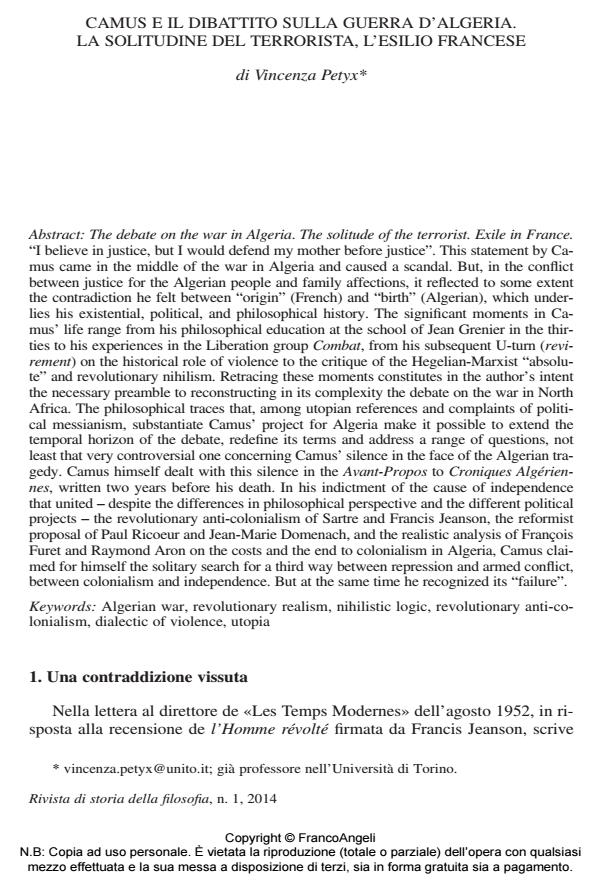The debate on the war in Algeria. The solitude of the terrorist. Exile in France
Journal title RIVISTA DI STORIA DELLA FILOSOFIA
Author/s Vincenza Petyx
Publishing Year 2014 Issue 2014/1
Language Italian Pages 34 P. 127-160 File size 608 KB
DOI 10.3280/SF2014-001005
DOI is like a bar code for intellectual property: to have more infomation
click here
Below, you can see the article first page
If you want to buy this article in PDF format, you can do it, following the instructions to buy download credits

FrancoAngeli is member of Publishers International Linking Association, Inc (PILA), a not-for-profit association which run the CrossRef service enabling links to and from online scholarly content.
"I believe in justice, but I would defend my mother before justice". This statement by Camus came in the middle of the war in Algeria and caused a scandal. But, in the conflict between justice for the Algerian people and family affections, it reflected to some extent the contradiction he felt between "origin" (French) and "birth" (Algerian), which underlies his existential, political, and philosophical history. The significant moments in Camus’ life range from his philosophical education at the school of Jean Grenier in the thirties to his experiences in the Liberation group Combat, from his subsequent U-turn (revirement) on the historical role of violence to the critique of the Hegelian-Marxist "absolute" and revolutionary nihilism. Retracing these moments constitutes in the author’s intent the necessary preamble to reconstructing in its complexity the debate on the war in North Africa. The philosophical traces that, among utopian references and complaints of political messianism, substantiate Camus’ project for Algeria make it possible to extend the temporal horizon of the debate, redefine its terms and address a range of questions, not least that very controversial one concerning Camus’ silence in the face of the Algerian tragedy. Camus himself dealt with this silence in the Avant-Propos to Croniques Algériennes, written two years before his death. In his indictment of the cause of independence that united - despite the differences in philosophical perspective and the different political projects - the revolutionary anti-colonialism of Sartre and Francis Jeanson, the reformist proposal of Paul Ricoeur and Jean-Marie Domenach, and the realistic analysis of François Furet and Raymond Aron on the costs and the end to colonialism in Algeria, Camus claimed for himself the solitary search for a third way between repression and armed conflict, between colonialism and independence. But at the same time he recognized its "failure".
Keywords: Algerian war, revolutionary realism, nihilistic logic, revolutionary anti-colonialism, dialectic of violence, utopia
Vincenza Petyx, Camus e il dibattito sulla guerra d’Algeria. La solitudine del terrorista, l’esilio francese in "RIVISTA DI STORIA DELLA FILOSOFIA" 1/2014, pp 127-160, DOI: 10.3280/SF2014-001005